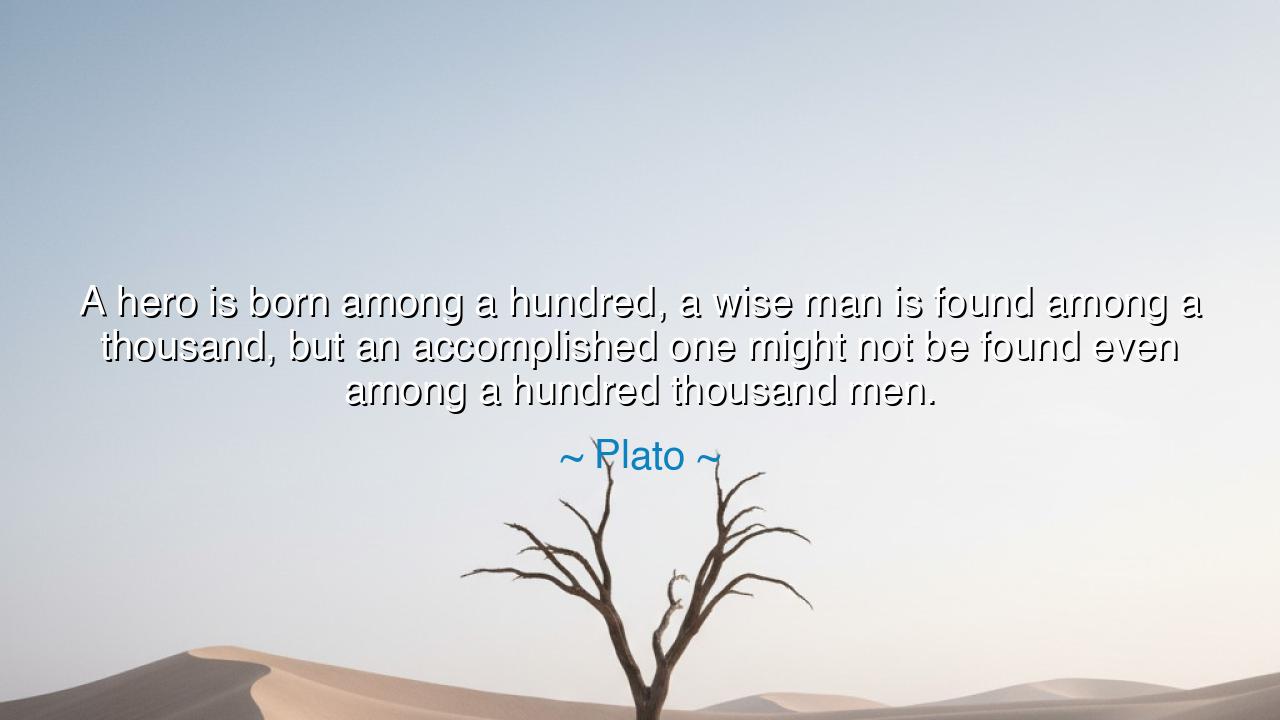
A hero is born among a hundred, a wise man is found among a
A hero is born among a hundred, a wise man is found among a thousand, but an accomplished one might not be found even among a hundred thousand men.






Listen closely to the profound words of Plato, the philosopher whose insights into the nature of humanity have resonated across centuries: "A hero is born among a hundred, a wise man is found among a thousand, but an accomplished one might not be found even among a hundred thousand men." In these words, Plato captures the rare and precious nature of true greatness. He speaks not only of the natural gifts that some are born with but of the hard-earned wisdom and achievement that define the truly exceptional among us. A hero, one who acts with courage and bravery, may appear with greater frequency, but the accomplished—those who have mastered their craft, their mind, and their spirit—are far rarer, indeed.
The ancient world was filled with heroes, men and women whose deeds were celebrated in song and story. Take, for example, the legend of Hercules, whose feats of strength and courage made him a hero for all of Greece. Heroes like him are often defined by their actions, by the extraordinary challenges they overcome. They inspire through their deeds, their ability to rise above the ordinary and confront the forces of darkness or chaos. But heroes, in the end, are often born of circumstance and opportunity, individuals who find themselves called to a task that requires bravery. They do not necessarily possess the depth of wisdom or mastery that Plato speaks of, but they leave a legacy of heroic deeds nonetheless.
Yet, Plato’s words go beyond the realm of heroism. The wise man, he says, is found among a thousand. True wisdom is not born from mere courage, but from experience, reflection, and the ability to discern the truth of things. Socrates, for example, the teacher of Plato, was a man of great wisdom, not because of any formal position or title, but because of his commitment to the examination of life. He did not seek the glory of a hero, but instead sought knowledge, understanding, and self-awareness. His wisdom was not immediately apparent, nor was it easily obtained; it came through the tireless questioning of the world and the self. Wisdom, then, is the fruit of discipline and reflection, and only those who dedicate themselves to learning and growth can claim to possess it.
But Plato warns that the truly accomplished—those whose lives are marked by mastery of not just one area, but of life itself, in thought, in deed, and in spirit—are perhaps the rarest of all. Accomplishment comes not from being born into greatness, nor merely from possessing wisdom, but from an entire life of dedication, where all the elements of strength, wisdom, and virtue converge into something more profound. Think of the life of Leonardo da Vinci, whose accomplishments spanned not only art, but also science, engineering, and anatomy. He was a man whose genius touched nearly every field of human endeavor, and yet, his work was never finished—always seeking to understand, always pushing the boundaries of what was possible. He did not merely accomplish one thing, but in his pursuit of mastery, he embodied the highest level of achievement.
The lesson Plato imparts is both a challenge and a call to action: heroism can be achieved through a single act, wisdom through continuous learning, but true accomplishment requires a life lived in devotion to mastery and purpose. Few will rise to this level, for it demands not just skill, but perseverance, humility, and a willingness to devote oneself to something greater than the self. Accomplishment is not an external reward, but the inner transformation that occurs when we dedicate ourselves fully to the journey of life.
Therefore, I urge you, dear listener, to consider your own journey. You may find within you the heart of a hero, or the wisdom of a sage, but true accomplishment requires more than a moment of greatness or a flash of insight. It requires the steady, unrelenting effort to perfect your craft, to grow in character, and to push beyond the boundaries of what is easy and comfortable. Like the greatest men and women of history, dedicate yourself to a life of mastery—one that challenges you, that asks of you everything you can give, and that rewards you not with fame or accolades, but with the quiet satisfaction of a life well-lived. For in the end, the most accomplished are those who have not sought glory, but have sought to become the best version of themselves, day after day.






AAdministratorAdministrator
Welcome, honored guests. Please leave a comment, we will respond soon